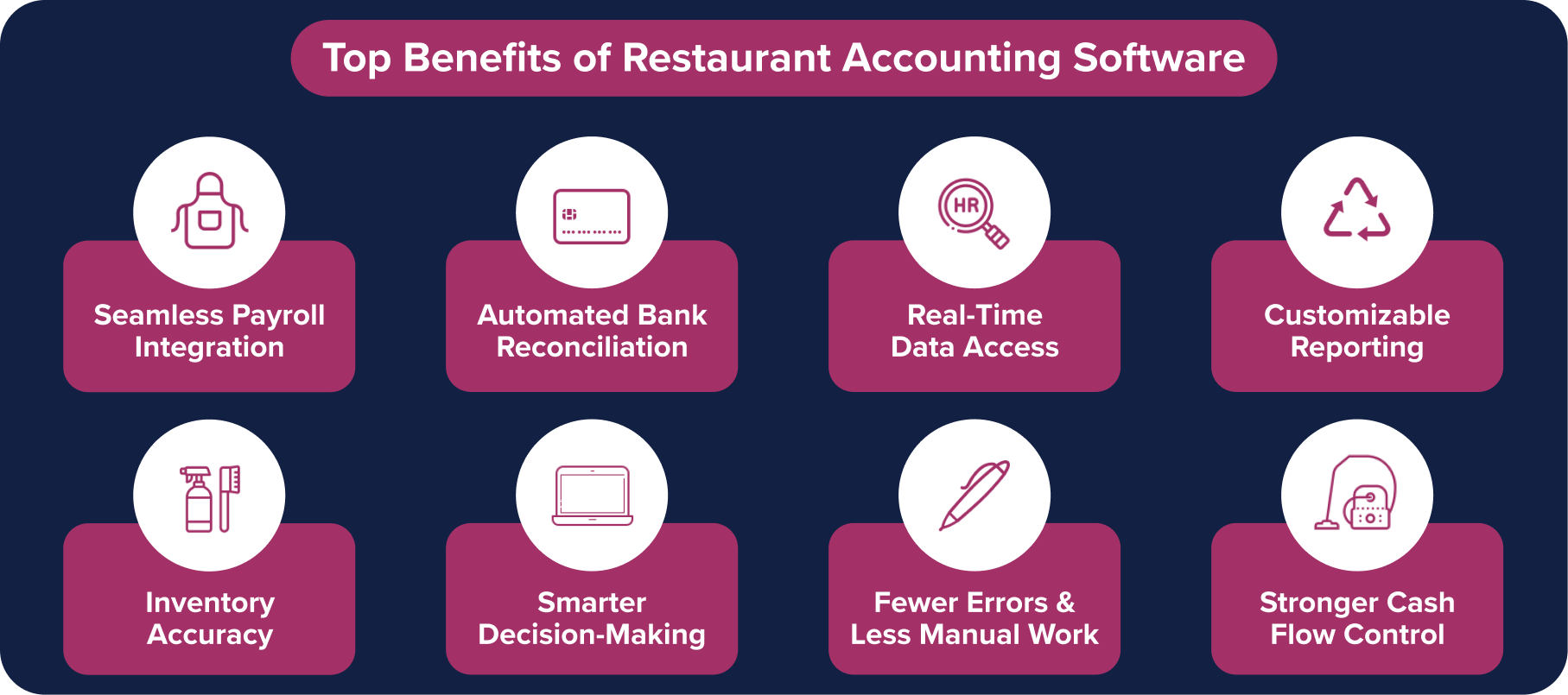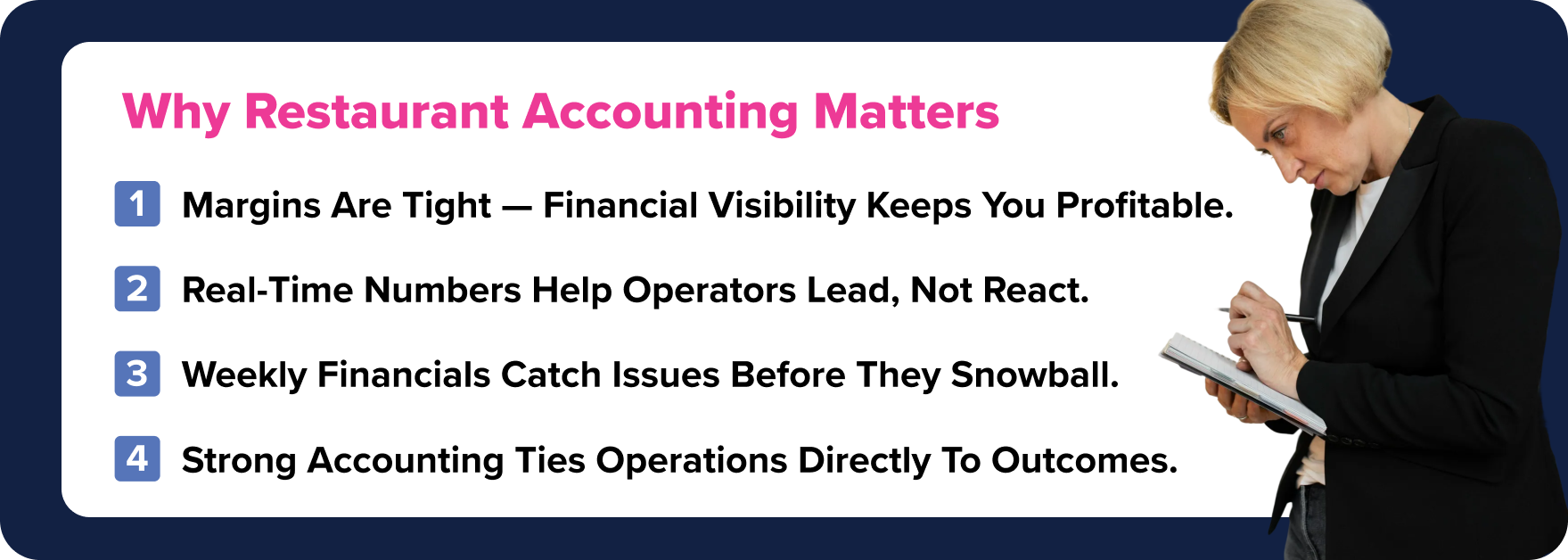Running a restaurant has a way of pulling you into a dozen directions before lunch even hits. One moment you’re coaching a line cook through a rush, and the next you’re trying to figure out why yesterday’s sales didn’t quite match what hit the bank. It’s a business built on tight timing, tighter margins, and the constant hum of decisions that never stop coming.
That’s why the operators who stay ahead aren’t the ones with the fanciest menus — they’re the ones with a clear handle on their numbers. And these days, that clarity usually starts with accounting software that was actually built for restaurants, not repurposed from some generic small-business template.
(If you’ve seen what Back Office can do, you know exactly what we mean.)
Why Accounting Is Vital for Restaurant Success
Talk to any operator who’s made it through more than one unpredictable year, and they’ll tell you the same thing: accounting is the quiet backbone of the whole operation. You can have incredible foot traffic, a killer menu, and a team that runs like a well-choreographed dance — none of it matters if you don’t actually know where your money is going.
Restaurant financials change constantly. Prices shift. Guests ebb and flow. A single off-week can throw the whole month off. Strong accounting is what keeps those ripples from turning into waves. When you can see your financials in something close to real time, you don’t spend your mornings reacting. You start leading.
And that’s why weekly financials (the Back Office standard) have become the gold standard for operators who want to stay profitable in an up-and-down market.
Key Benefits of Restaurant Accounting Software

1. Seamless Payroll Integration
Anyone who’s ever closed a pay period manually knows it’s not for the faint of heart. Pulling hours, checking overtime rules, layering in PTO — it’s draining and far too easy to get wrong. When your accounting software connects directly to your labor data, those pieces fall into place without the end-of-week scramble. It’s clean, consistent, and saves your GM from a whole lot of “Why is this off?” moments.
2. Automated Bank Reconciliation
This is one of those tasks that operators don’t talk about much, but everyone feels. Matching deposits to bank statements shouldn’t feel like you’re solving a mystery novel. Software that automates reconciliation clears out the noise quickly so you can catch issues early — not three weeks after the fact.
3. Real-Time Data Access
The restaurant world doesn’t reward people who wait around for a monthly P&L. Operators need visibility now, especially when food costs swing or labor drifts past target. Accounting software that updates throughout the week gives you that edge. Tools like Back Office were designed around the idea that timing and accuracy can make or break a week — and honestly, they do.
4. Customizable Reporting
Every operator has their own style. Some want big-picture trends; others want to zoom all the way into a single line item. Good accounting software lets you see your business the way you run it. Whether you’re comparing units side-by-side, tracking prime cost over time, or drilling into an invoice to understand a variance, customizable reporting helps you move with intention instead of guesswork.
5. Accurate Inventory Tracking
Inventory is one of those things that quietly controls your profitability. When it’s off, everything’s off. When inventory ties into the accounting system, the numbers actually reflect what’s happening in the kitchen. Operators can spot over-portioning, waste, or supply issues early and course-correct before margins take the hit.
6. Informed Decision-Making
Data is only useful if it tells you something you can act on. Restaurant accounting software connects the dots between what’s happening on the floor and what’s showing up on your financials. You can see patterns, understand why a certain week dipped, and make decisions rooted in reality — not hunches. Back Office operators lean on this constantly, and many credit weekly insights for helping them grow into additional units.
7. Reduced Errors and Manual Work
Most operators don’t have time to babysit spreadsheets, and they definitely don’t have time to untangle mistakes caused by manual entry. Accounting software handles the repetitive work so your time (and energy) can go toward more meaningful decisions. It keeps the books cleaner and frees your team from the grind of re-keying data.
8. Enhanced Cash Flow Management
Cash flow is the pressure point every operator feels. Accounting software gives you the visibility to stay ahead of dips, slow weeks, or unexpected expenses. Being able to see exactly what’s going on — and when — means you can make decisions with a steadier hand.
How to Choose the Right Accounting Software for Your Restaurant
If you’re evaluating options, here’s what usually separates the great platforms from the ones that make you feel like you’ve just added one more thing to your to-do list:
- Look for a platform built specifically for restaurants. A generic tool can track numbers, but it won’t understand the rhythm of your business.
- Make sure it plays nicely with the systems you already use — POS, payroll, inventory, purchasing.
- Dashboards should feel clear, not cluttered.
- Insights should come weekly (or better), not once a month when the moment’s already passed.
- And when you can get expert support — like the advisors tied to Back Office — it’s a game-changer.
And if you want to go beyond the basics, Back Office put together a Restaurant Accounting Guide that breaks the whole process down in a way operators can actually use. Whether you’re weighing different tools or trying to figure out which features really drive profitability, it’s a solid resource to keep bookmarked.
The Bottom Line for Restaurant Operators
Restaurant accounting software has evolved into one of the most powerful levers operators can pull. It sharpens financial visibility, cuts down on errors, and gives leaders the confidence to steer their operations proactively instead of reactively.
For operators who want that kind of control — and the clarity that comes with it — experts like Back Office offer a path to better decisions, stronger margins, and a business that grows with more intention and less chaos.
Click here to if you’re ready to get more control over your numbers and finally trade reactive bookkeeping for clear, confident decision-making.



